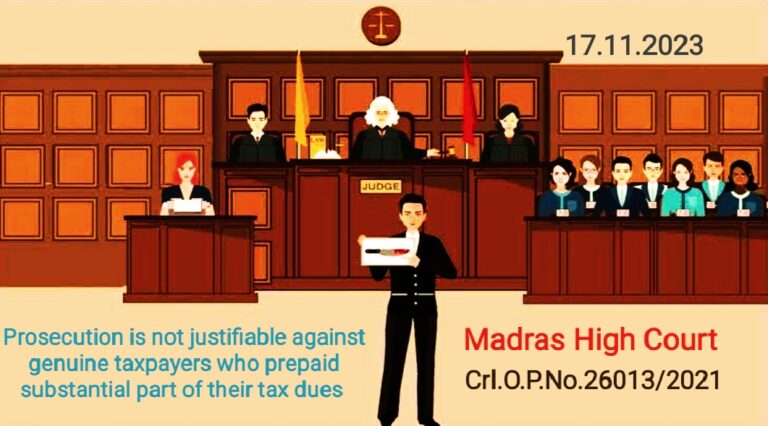Prosecution u/s. 276CC Against Genuine Taxpayers who have Diligently Prepaid a Significant Portion of their Tax Obligations is not Justifiable: Madras High Court Order Dt. 17 November 2023
Legality of Prosecution Against Genuine Taxpayers who Prepaid Substantial Part of their Tax Dues: In a ground-breaking decision on November 17, 2023, the Madras High Court delivered a significant verdict in the case of Manav Menon v. The Deputy Commissioner of Income Tax. The ruling provides protection to genuine taxpayers who have prepaid a substantial portion of their tax dues, stating that they cannot be prosecuted under Section 276CC of the Income Tax Act for non-filing of Income Tax returns.
Summary of the Judgment:
The judgment, delivered by Justice G.K. Ilanthiraiyan, quashed criminal proceedings initiated against an individual under Section 276CC for wilful failure to file an income tax return. Justice Ilanthiraiyan, citing the proviso (ii)(b) to Section 276CC, emphasized that the proviso safeguards genuine assesses who either file returns belatedly within the assessment year’s end or have paid a substantial amount of their tax dues through prepaid taxes from prosecution.
Case Background:
The case originated from a complaint filed by the Revenue Department under Section 276CC against the assessee for non-filing of income tax return for the Assessment Year 2013-14. In response, the assessee argued that despite filing the return belatedly, the payable tax did not exceed Rs.3,000; in fact, there was a refund of Rs.460. The assessee contended that, based on the proviso (ii)(b) to Section 276CC, no prosecution should be initiated. Additionally, the assessee highlighted the premature nature of the prosecution, as it was initiated before the completion of the assessment.
The crux of the Special Public Prosecutor’s argument in support of the revenue department lies in the petitioner’s admitted failure to comply with the statutory requirement of filing income tax returns. The initiation of prosecution under Section 276CC, according to the prosecutor, was a rightful response to the petitioner’s non-compliance, even after the issuance of a notice under the relevant section. The prosecutor emphasized that, in light of these circumstances, the petitioner cannot assert any entitlement to benefits under the proviso to sub-clause ii(b) of Section 276CC of the Income Tax Act
Court’s Decision:
After careful consideration, the Bench found that the assessee had prepaid taxes and was eligible for a refund. The court held that the proviso protected the assessee from prosecution under Section 276CC. Consequently, the court ruled that the assessee should not be prosecuted for failing to furnish the return under Section 139(1). The judgment concluded that, as the tax payable after the credit of prepaid taxes was below the prescribed sum, prosecution under Section 276CC was unsustainable.
Outcome of the Judgment:
The court ordered the quashing of the initiation of prosecution for the offense under Section 276CC of the Income Tax Act against the petitioner. The entire proceedings in EOCC.No.168 of 2016 on the file of the learned Additional Chief Metropolitan Magistrate, (E.O-II) Egmore, Chennai, were quashed. As a result, the criminal original petition was allowed, and connected miscellaneous petitions were closed.
Conclusion:
This landmark judgment by the Madras High Court sets a precedent, offering protection to genuine taxpayers who have diligently prepaid a significant portion of their tax obligations. The decision emphasizes the importance of considering individual circumstances and extends a shield to taxpayers from unwarranted prosecutions under Section 276CC.
Explanatory Note: Understanding Section 276CC of the Income Tax Act (Prosecution and Penalties for Non-Filing of Income Tax Returns)
Section 276CC of the Income Tax Act holds significance as it outlines the provisions for prosecution and penalties in cases of wilful failure to furnish a return of income. This section comes into play when a taxpayer is found in default of the following:
(i) Failure to file the return of income as required by Section 139(1).
(ii) Failure to file the return of income in response to a notice issued under Section 142(1)(i), Section 148, or Section 153A.
Penalties:
The consequences for these failures are outlined as follows:
(i) In cases where the tax sought to be evaded exceeds Rs. 25 lakhs (Rs. 1 lakh up to 30-6-2012), rigorous imprisonment ranging from not less than 6 months to a maximum of seven years, along with a fine.
(ii) In other cases, where the tax evasion is below the mentioned threshold, the penalty includes rigorous imprisonment for a term not less than 3 months but extendable to two years (3 years up to 30-6-2012), coupled with a fine.
Exceptions:
However, a taxpayer is exempt from prosecution under Section 276CC in certain scenarios:
(i) If the return is furnished before the expiry of the assessment year.
(ii) If the tax payable by the taxpayer (excluding companies) on the total income determined on regular assessment, after accounting for advance tax and TDS, does not exceed Rs. 10,000.
Recent Amendment:
A noteworthy amendment introduced by the Finance Act, 2022, for Assessment Year 2022-23 onwards, states that no prosecution under Section 276CC will be initiated for failure to furnish a return of income under Section 139(1) if an updated return is submitted by the assessee within the timeframe specified in Section 139(8A).
To Know More About Different Provisions of Prosecution Proceedings under I-T Act CLICK HERE
To Access the CBDT Notification No. 99/2023 CLICK HERE
Read More
Kerala High Court Directs Review of ITC Denial Based on Difference Between GSTR-2A and GSTR-3B
